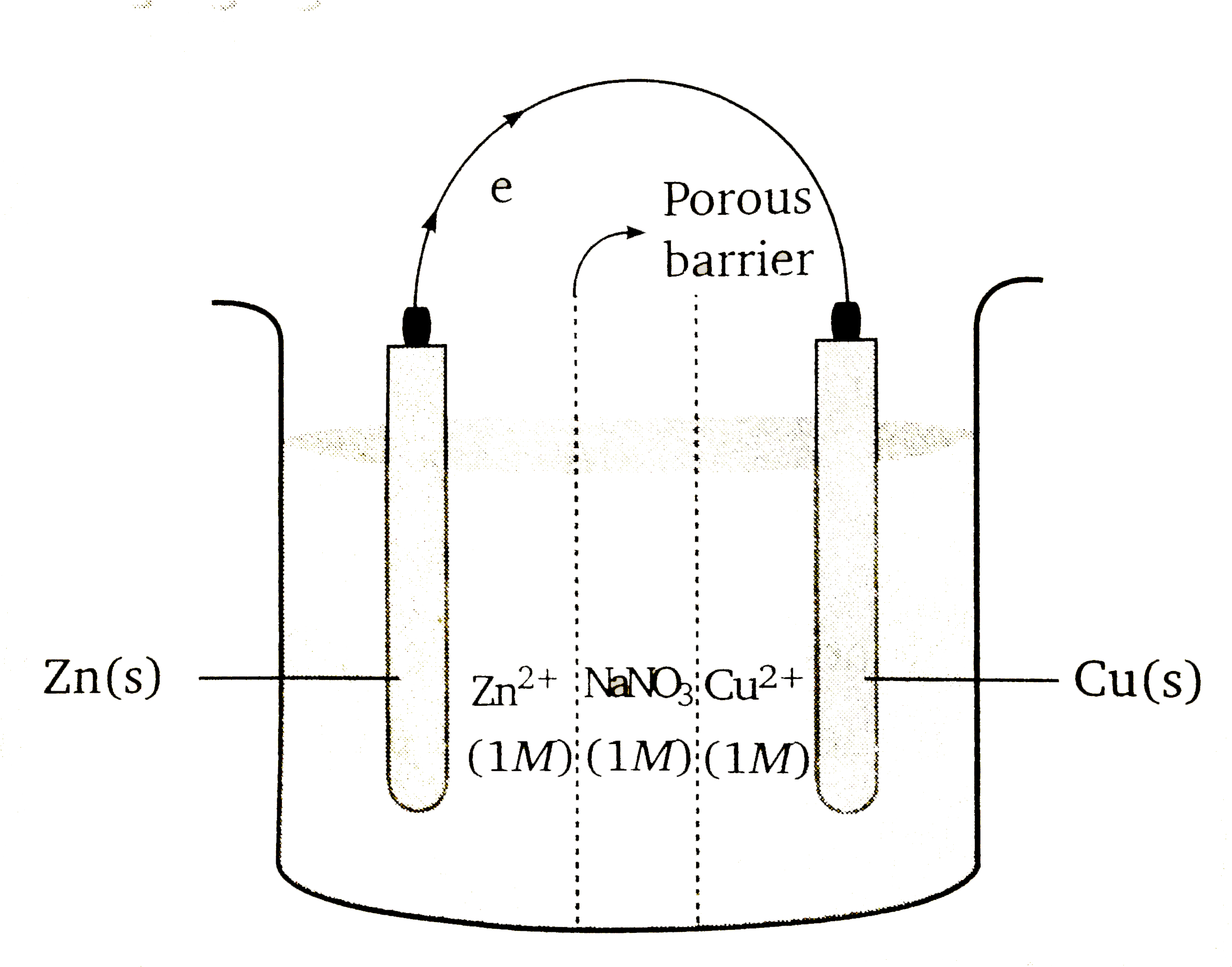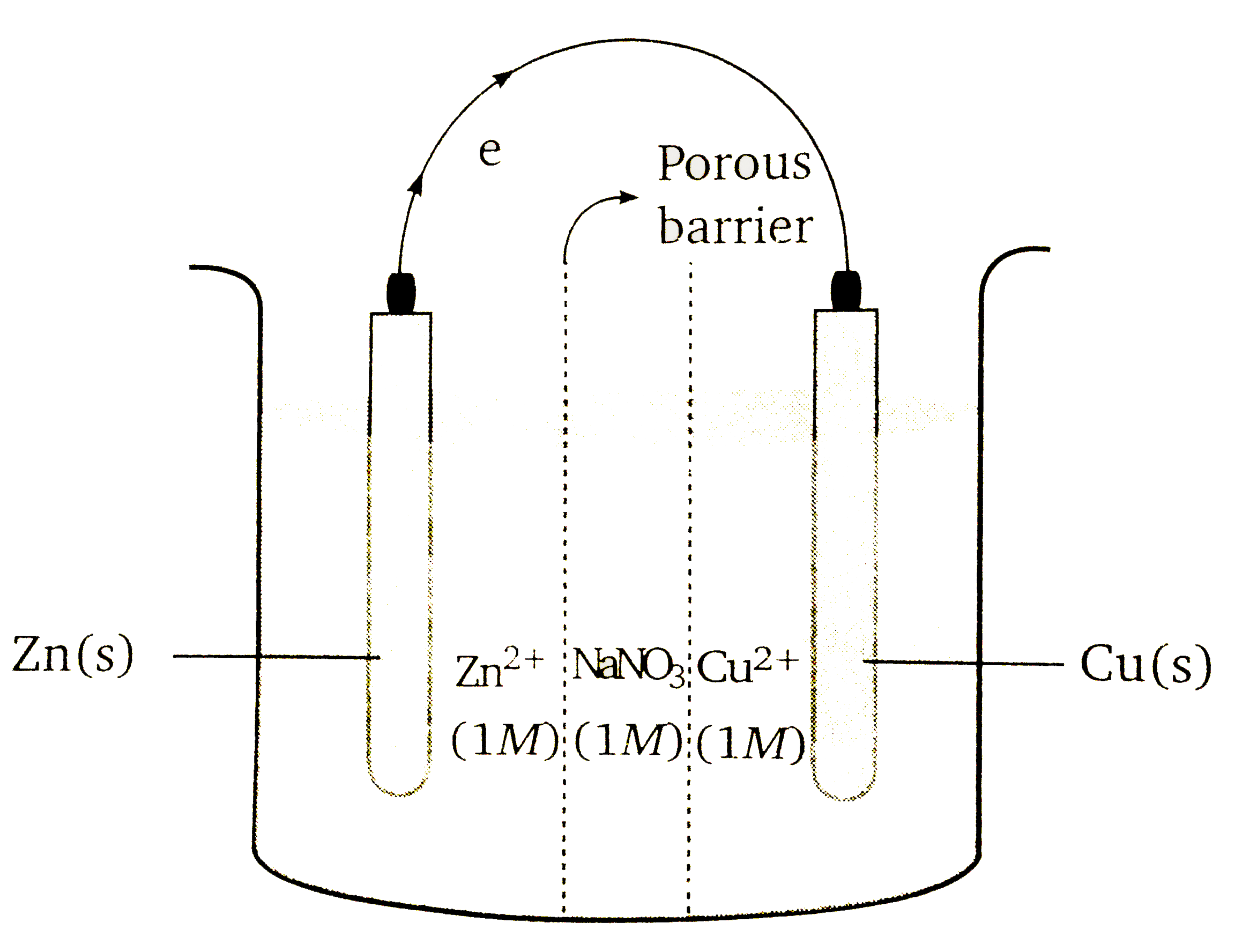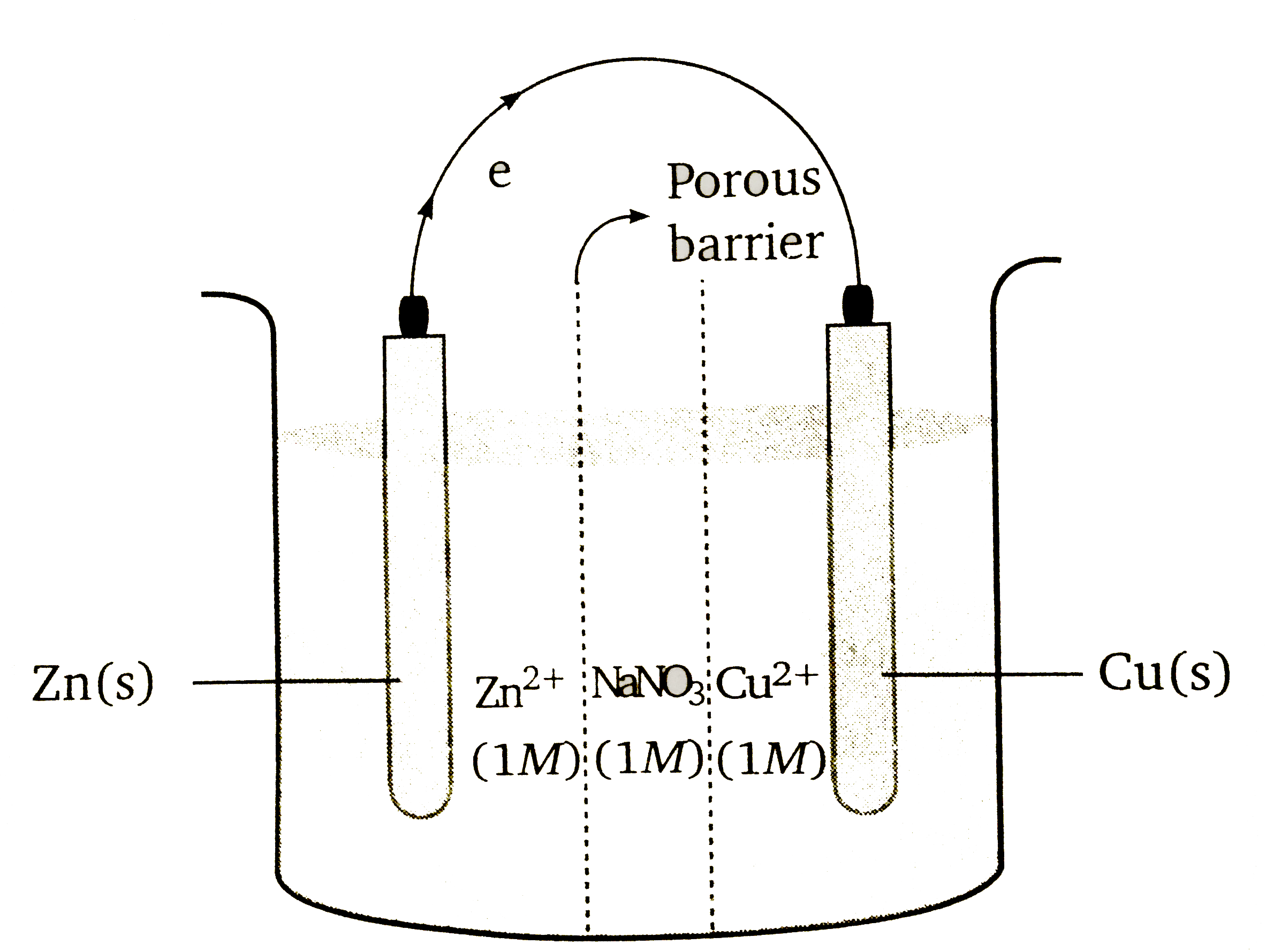Complete Solutions to LEVEL-3 of chapter ELECTROCHEMISTRY of Class 11 book with complete answers and questions
| Class 11 | CHEMISTRY |
| Chapter | ELECTROCHEMISTRY |
| NARENDRA AWASTHI | LEVEL-3 |
| Number Of Questions | 37 |
| Academic Year | 2023-24 |

A Galvanic cell consits of three compartment as shown in figure. The first compartment contain `ZnSO_4`(1M) and III compartment contain `CuSO_4`(1M). The mid compartment contain `NaNO_3` (1M). Each compartment contain 1L solution:
`E_(Zn^(2+)//Zn)^(@)=-0.76`, `E_(Cu^(2+)//Cu)^(@)=+0.34`,
The concertation of `Zn^(2+)` in first compartment after passage of 0.1 F charge will be:
View Solution
A Galvanic cell consits of three compartment as shown in figure. The first compartment contain `ZnSO_4`(1M) and III compartment contain `CuSO_4`(1M). The mid compartment contain `NaNO_3` (1M). Each compartment contain 1L solution:
`E_(Zn^(2+)//Zn)^(@)=-0.76`, `E_(Cu^(2+)//Cu)^(@)=+0.34`
The concentration of `NO_3^-` in mid compartment after passage of 0.1 F of charge will be:
View Solution
A Galvanic cell consits of three compartment as shown in figure. The first compartment contain `ZnSO_4`(1M) and III compartment contain `CuSO_4`(1M). The mid compartment contain `NaNO_3` (1M). Each compartment contain 1L solution:
`E_(Zn^(2+)//Zn)^(@)=-0.76`, `E_(Cu^(2+)//Cu)^(@)=+0.34`
The concentration of `SO_4^(2-)` ions in III compartment after passage of 0.1 F of charge will be:
View SolutionThe cell potential `(E_(cell))` of a reaction is related as `/_\G=-nF E_(cell)`, where `/_\G `represents max. useful electrical work
n=no. of moles of electrons exchanged during the section
for reversible cell reaction `d(/_\G)=(/_\_rV)dp-(/_\_rS),dT`
at constant pressure `d(/_\G)=-(/_\_rS).dT`
:' At constant pressure `/_\G=/_\H-T./_\S`
:. `/_\G=H+T(d(/_\G))/((dT)_P)`
`((dE_(cell))/(dT))_P` is known as temperture coefficient of the e.m.f of the cell.
The temperature coefficient of the e.m.f of cell, `((dE)/(dT))_P` si given by:
View SolutionAt 300 k, `/_\ H`for the reaction
`Zn(s)+AgCl(s)toZnCl_2(aq)+2Ag(s)` is
-218 KJ/mol while the e.m.f of the cell was 1.015V. `((dE)/(dT))_p` of the cell is :
View SolutionAt 300 k, `/_\ H`for the reaction
`Zn(s)+AgCl(s)toZnCl_2(aq)+2Ag(s)` is
`-218 KJ/mol `while the e.m.f of the cell was 1.015V. `((dE)/(dT))_p` of the cell is `-0.000381 VK^(-1)`. Calculate `/_\S` for the given cell reaction.
View SolutionThe molar conductivity of 0.04 M solution of `MgCl_2` is 200 `Scm^2mol^(-1)` at 298 k. A cell with electrodes that are 2.0`cm^2` in surface area and 0.50cm apart is filled with `MgCl_2` solution.
Conductance of `MgCl_2` solution is :
View SolutionThe molar conductivity of 0.04 M solution of `MgCl_2` is 200 `Scm^2mol^(-1)` at 298 k. A cell with electrodes that are 2.0`cm^2` in surface area and 0.50cm apart is filled with `MgCl_2` solution
How much current will flow when the potential difference between the two electrodes is 5.0V?
View SolutionIn a hydrogen oxyge fuel cell, electricity is produced. In this process `H_2`(g) is oxided at anode and `O_2`(g) reduced at cathode
Given: Cathode `O_2(g)+2H_2O(l)+4e^(-)to4OH^(-)(aq)`
Anode `H_2(g)+2OH^(-)(aq)to2H_2O(l)+2e^(-)`
4.48 litre `H_2` at 1atm and 273 k oxidised in 9650 sec.
The current produced is (in amp):
View SolutionIn a hydrogen oxyge fuel cell, electricity is produced. In this process `H_2`(g) is oxided at anode and `O_2`(g) reduced at cathode
Given: Cathode `O_2(g)+2H_2O(l)+4e^(-)to4OH^(-)(aq)`
Anode `H_2(g)+2OH^(-)(aq)to2H_2O(l)+2e^(-)`
4.48 litre `H_2` at 1atm and 273 k oxidised in 9650 sec.
The mass of water produced is :
View SolutionIn a hydrogen oxyge fuel cell, electricity is produced. In this process `H_2`(g) is oxided at anode and `O_2`(g) reduced at cathode
Given: Cathode `O_2(g)+2H_2O(l)+4e^(-)to4OH^(-)(aq)`
Anode `H_2(g)+2OH^(-)(aq)to2H_2O(l)+2e^(-)`
4.48 litre `H_2` at 1atm and 273 k oxidised in 9650 sec.
If current produced in fuel cell, is used for the deposition of `Cu^(+2)` in 1L,2M `CuSO_4`(aq) solution for 241.25 sec using Pt. electrode, the pH of solution after electrolysis is:
View SolutionA saturated solution in `AgX(K_(sp)=3xx10^(-12))` and `AgY(K_(sp)=10^(-12))` has conductivity `0.4xx10^(-6)Omega^(-1)cm^(-1)`.
Given: Limiting molar conductivity of `Ag^+=60Omega^(-1)cm^2mol^(-1)`
Limiting molar conductivity of `X^(-)=90Omega^(-1)cm^2mol^(-1)`
The conductivity of `Y^(-)` is (in `Omega^(-1)cm^(-1)`):
View SolutionA saturated solution in `AgX(K_(sp)=3xx10^(-12))` and `AgY(K_(sp)=10^(-12))` has conductivity `0.4xx10^(-6)Omega^(-1)cm^(-1)`.
Given: Limiting molar conductivity of `Ag^+=60Omega^(-1)cm^2mol^(-1)`
Limiting molar conductivity of `X^(-)=90Omega^(-1)cm^2mol^(-1)`
The conductivity of `Y^(-)` is (in `Omega^(-1)cm^(-1)`):
View SolutionIf the e.m.f of a galvanic cell is negative, it implies that:
View SolutionSelect correct statement(s) about electrolysis:
View SolutionIf the half-cell reaction `A+e^(-)toA^(-)` has a large negative reduction potentials, it follows that:
View SolutionWhich of the following statements is correct? If `E_(Cu^(2+)|Cu)^(@)=0.34V, E_(Sn^(2+)|Sn)^(@)=-0.136V,E_(H^+|H_2)^(@)=-0.0V`
View SolutionThe oxidation potential of hydrogen half-cell will be negative if:
View Solutionwhich of the following arrangement will procedure oxygen at anode during electrolysis?
View SolutionWhen an aqueous concentrated solution of lithium chloride is electrolysed using inert electrodes:
View SolutionOxygen and hydrogen gas are produced at the anode and cathode during the electrolysis of fairly concentration aqueous solution of :
View SolutionDuring the purification of copper by electrolysis:
(a)the anode used is made of copper ore
(b)pure copper is deposited on the cathode
(c)the impurities such as Ag, Au present in solution as ions
(d)concentration of `CuSO_4` solution remains constant during dissolution of Cu
View SolutionWhen a lead storage battery is discharged:
View SolutionWhich of the following is characteristic of the cathode in a voltaic cell?
View SolutionIn an electrochemical process, a salt bridge is used:
View SolutionFor a reaction in a galvanic cell the value of `-/_\G^(@)` at certain temperature is not necessarily equal to:
View SolutionGiven that `E_(Fe^(2+)//Fe)^(.)=-0.44V,E_(Fe^(3+)//Fe^(2+))^(@)=0.77V` if `Fe^(2+),Fe^(3+)` and `Fe` solid are kept together then
View Solutionwhich of the following statements are correct regarding to galvanic cell?
View SolutionWhich of the following are concentration cell?
View SolutionIn electrolyte concentration cell:
View SolutionThe standard electrode of a metal ion `(Ag|Ag^(o+))` and metal `-` insoluble salt anion `(Ag|AgCl|Cl^(-))` are related as
View SolutionWhich of the following units is correctly matched?
View SolutionWhich of the following statements is/are correct?
View SolutionWhich is/are correct statement?
View SolutionA dilute solution of KCl was placed between two Pt electrodes 10cm apart across which a potential difference of 10 volt was applied. Which is /are correct statement (Given: molar conductivity of `K^+` at infinite dilution is `96.5 Scm^2mol^(-1)`
View SolutionGiven:`Pt(s)"|"underset(P_1atm)Cl_2(g)"|"Cl^(-)(C_1)"||"Cl^(-)(C_2)"|"underset(P_2atm)``(Cl)_(2)`(g)| `Pt(s)`
identify in which of following condition working of cell takes place:
View Solution1000mL 1M `CuSO_4`(aq) is electrolysed by 9.65 A current for 100 sec using Pt-electrode which is /are correct statements?
View Solution
LEVEL-3 questions and complete solutions for chapter ELECTROCHEMISTRY of NARENDER AVASTHI CHEMISTRY (ENGLISH) of Class 11